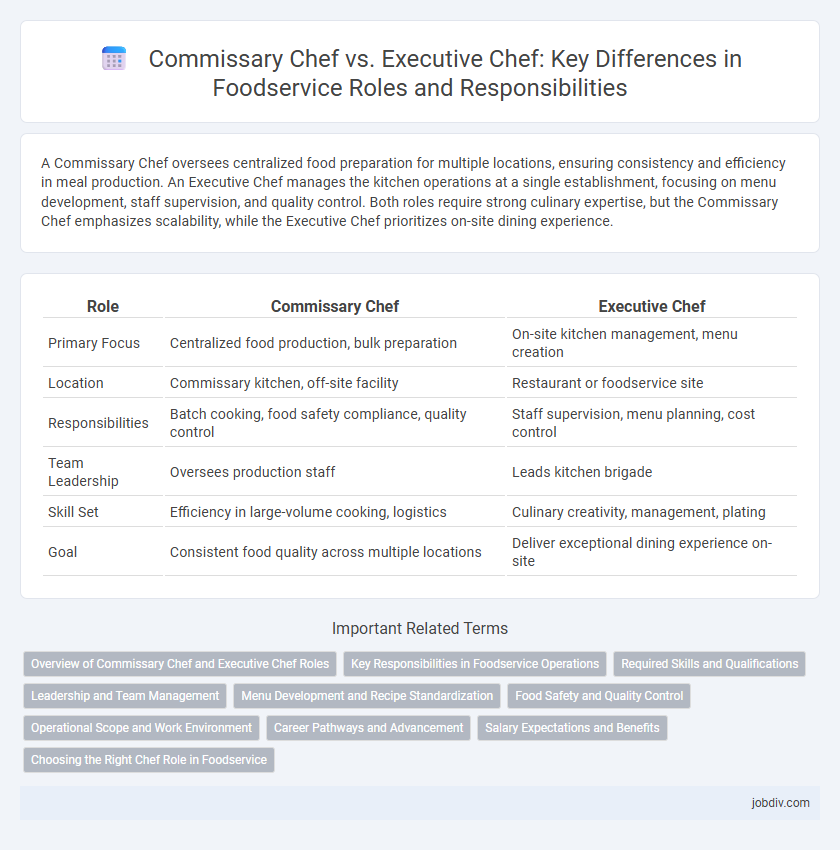A Commissary Chef oversees centralized food preparation for multiple locations, ensuring consistency and efficiency in meal production. An Executive Chef manages the kitchen operations at a single establishment, focusing on menu development, staff supervision, and quality control. Both roles require strong culinary expertise, but the Commissary Chef emphasizes scalability, while the Executive Chef prioritizes on-site dining experience.
Table of Comparison
| Role | Commissary Chef | Executive Chef |
|---|---|---|
| Primary Focus | Centralized food production, bulk preparation | On-site kitchen management, menu creation |
| Location | Commissary kitchen, off-site facility | Restaurant or foodservice site |
| Responsibilities | Batch cooking, food safety compliance, quality control | Staff supervision, menu planning, cost control |
| Team Leadership | Oversees production staff | Leads kitchen brigade |
| Skill Set | Efficiency in large-volume cooking, logistics | Culinary creativity, management, plating |
| Goal | Consistent food quality across multiple locations | Deliver exceptional dining experience on-site |
Overview of Commissary Chef and Executive Chef Roles
Commissary chefs specialize in large-scale food production, managing centralized kitchens that prepare and distribute meals to multiple locations, ensuring consistent quality and efficient inventory control. Executive chefs oversee restaurant or foodservice operations, directing kitchen staff, designing menus, and maintaining high culinary standards to enhance customer satisfaction and operational profitability. Both roles require strong leadership and culinary expertise but differ primarily in focus; commissary chefs emphasize bulk food preparation and logistics, while executive chefs prioritize on-site kitchen management and guest experience.
Key Responsibilities in Foodservice Operations
Commissary chefs specialize in large-scale food production, overseeing batch cooking, ingredient procurement, and maintaining strict hygiene standards to supply multiple foodservice outlets. Executive chefs manage day-to-day kitchen operations, menu planning, staff supervision, and quality control within a single restaurant or hospitality venue. Both roles require strong leadership and culinary expertise, but the commissary chef focuses on centralized production efficiency, while the executive chef prioritizes on-site guest experience and operational flow.
Required Skills and Qualifications
Commissary Chefs require strong organizational skills, expertise in batch cooking, and experience in food safety compliance to manage large-scale meal preparation efficiently. Executive Chefs need advanced culinary techniques, leadership abilities, and proficiency in menu development, budgeting, and staff management to oversee kitchen operations and ensure high-quality dining experiences. Both roles demand certification in food safety and extensive industry experience, but the Executive Chef position emphasizes managerial skills and creativity.
Leadership and Team Management
Commissary chefs specialize in overseeing large-scale food production in centralized kitchens, emphasizing efficient workflow management and standardized processes to support multiple foodservice locations. Executive chefs lead individual restaurant kitchens with a focus on creative menu development, staff training, and direct supervision of culinary teams to ensure high-quality guest experiences. Both roles require strong leadership skills, but commissary chefs prioritize operational logistics while executive chefs concentrate on kitchen culture and team motivation.
Menu Development and Recipe Standardization
Commissary chefs focus on large-scale menu development and recipe standardization to ensure consistent quality across multiple foodservice locations, utilizing centralized production methods. Executive chefs typically customize menus and standardize recipes within a single establishment, balancing creativity with uniformity to optimize kitchen operations and customer satisfaction. Both roles prioritize efficiency and consistency, but commissary chefs emphasize scalability while executive chefs focus on tailored dining experiences.
Food Safety and Quality Control
Commissary chefs manage centralized kitchens, emphasizing stringent food safety protocols and consistent quality control across multiple foodservice outlets to prevent contamination and ensure uniform standards. Executive chefs oversee on-site kitchen operations, focusing on immediate implementation of safety procedures and maintaining ingredient quality to deliver high-standard dishes. Both roles require comprehensive knowledge of HACCP guidelines and rigorous monitoring to uphold food safety and optimize product consistency.
Operational Scope and Work Environment
A Commissary Chef typically oversees large-scale food production in centralized kitchens, focusing on batch cooking, inventory management, and ensuring consistent quality for multiple foodservice locations. In contrast, an Executive Chef manages on-site kitchen operations, staff supervision, menu planning, and customer service within a single hospitality venue or restaurant. The Commissary Chef operates in a controlled, industrial-style environment, while the Executive Chef thrives in dynamic, client-facing settings.
Career Pathways and Advancement
Commissary chefs specialize in mass food production for multiple locations, developing skills in large-scale menu planning and inventory management, which can lead to supervisory roles in centralized kitchens. Executive chefs oversee overall kitchen operations, staff management, and menu innovation in individual restaurants, often advancing to corporate culinary director or regional executive positions. Career pathways for both roles emphasize leadership, culinary expertise, and operational efficiency, with executive chefs typically holding higher-ranking positions due to broader responsibilities.
Salary Expectations and Benefits
Commissary chefs typically earn salaries ranging from $45,000 to $65,000 annually, with benefits often including health insurance and paid time off due to their centralized food production role. Executive chefs command higher salaries, averaging between $60,000 and $90,000 per year, reflecting their responsibility for menu development, kitchen management, and staff supervision, often accompanied by bonuses, profit sharing, and comprehensive benefits packages. Salary expectations for both positions vary by geographic location, establishment size, and individual experience, with executive chefs generally positioned for greater financial rewards and career advancement opportunities.
Choosing the Right Chef Role in Foodservice
Selecting the right chef role in foodservice hinges on operational needs and scale; a Commissary Chef specializes in preparing large quantities of ingredients and meals centrally for multiple locations, ensuring consistency and efficiency. An Executive Chef oversees kitchen operations, menu development, staff management, and quality control within a single establishment or unit. Understanding the distinction allows foodservice managers to align culinary leadership with business goals, optimizing productivity and guest satisfaction.
Commissary Chef vs Executive Chef Infographic

 jobdiv.com
jobdiv.com